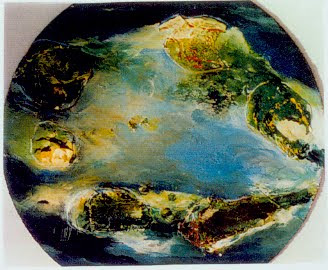 Claude Monet's most popular painting. One of his last
Claude Monet's most popular painting. One of his lastpaintings before he became blind. Impressionism. Nymphaea
 Latex can be used like watercolor at the same time.
Latex can be used like watercolor at the same time.Just add water as you paint. Use Oslo paper or
illustration board. Water strider.
Abe V Rotor
Yes, you can paint.
Young or old, art knows no age. Art is not correct or wrong. It is theory, and it is your own. This is what is known as expression. Art is expression. A holistic one because it takes many faculties to create one - from logic to imagination, from visual to touch, traditional to contemporary.
But first, how do you begin?
1. You need only three primary colors - yellow, red and blue. Plus a lot of white and a little black. You can create all the colors of the rainbow. And you can do more in various hues and shades.
2. Red and yellow make orange; yellow and blue, green; blue and red, brown or purple. If you combine the three primary colors in equal proportion, you'll get black.
3. Secondary colors lead you to tertiary. If you get lost you can trace it back to secondary. And you will not deviate from your color scheme.
4. White makes any color lighter: red to pink, yellow to cream, navy blue to sky blue, black to gray, orange to tangerine.
5. Black darkens colors. It is used to make shades and shadows. Contrast. If too much, your painting become drab, even "muddy."
6. You need simple tools. Hardware paintbrushes 1/2" to 3" wide are relatively cheap. For artist brushes, buy from bookstores and art supplies. Get flat brushes - smallest 1/16", biggest 1"). Get one or two round brushes. Because latex is water based, you need only few brushes; you can wash them while painting.
7. Use disposable palette board such as cardboard and plywood. You can make your own canvas. Canvas is sold by yard from upholstery stores. You can make several paint canvases from a yard of 60" wide canvas. You can use illustration board. For murals I use marine plywood 1/2" to 3/4" thick, 4 ft by 8 feet.
8. Do not be afraid to experiment. Try finger painting. Palette painting. Paint as you imagine and feel. Don't be exacting, unless your subject requires it.
9. Foundation or primer is the same white latex you will be using. I prefer gloss white latex. Get more white than any of the colors. Allow the primer to dry, sandpaper it before you start to paint. Latex dries fast, so you have to work fast, too - unlike oil, it takes hours or days.
10. As much as possible mix colors first on the palette board before your apply. Of course, you can experiment by mixing colors now and then on the canvas itself. You will discover new techniques and develop your style. Never use oil and latex at the same time, latex and lacquer. But you can use permanent ink markers for lines and margins, and to enhance details.
11. Work on the light areas first, like sky, then proceed to the dark areas, like group of trees, bottom of rocks, shades and shadows, last. Work spontaneously. You know when to stop, then prepare for a second or third - or nth sitting. One sitting is 30 to 60 minutes.
12. Never abandon your work. Every painting is a masterpiece in your own right, as long as you did the best you could, honestly and lovingly. Treasure it.
And remember, painting is not just a hobby. It is therapy. It is prayer. It is universal language. It is timeless. Art is a bridge of the known and the unknown, the Creator and His creation. ~
NOTE: I'll be posting more guidelines. But first, start painting. Listen to Paaralang Bayan sa Himpapawid (School-on-Air). DZRB 738 KHZ AM Band 8 to 9 evening Monday to Friday
www.pbs.gov.ph - Ka Abe and Ka Melly
Living with Nature 3, AVR








No comments:
Post a Comment